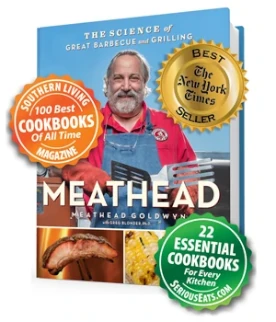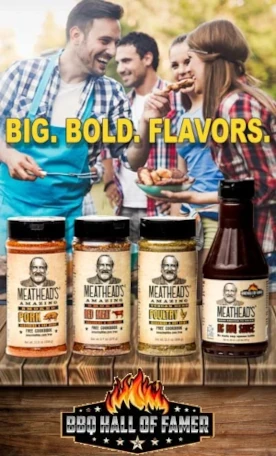Saw someone talking about using heating pellets in their pellet smoker. My particular brand of pellet burner, Pellet Pro, clearly discourages their use. Since they are not made as a fuel source for food I would think they might have additives that may not be healthy, but I have no idea since it does not appear that pellets have any mandatory standards. The reason I'm even bringing this up is this 40# bag of pellets cost $4 !!! I mean I pay nearly 10x that amount for competition blend pellets. Are we getting hood winked by the pellet manufacturers?

Announcement
Collapse
No announcement yet.
Heating Pellets
Collapse
X
-
http://www.traegergrills.com/faqsCAN I USE HEATING PELLETS IN MY GRILL?
No, our grills are built to function with Traeger Brand food-grade pellets. Heating pellets contain glues and chemicals that are not safe for food.
While I know Traeger wants people to buy their $18.99 bag of pellets, I still believe this is valid therefore I wouldn't want to use heating pellets in my pellet grill.Last edited by (Lance); November 7, 2017, 10:18 AM.
- Likes 1
-
I don't know. I imagine the process is different where they need to apply more pressure or heat to create pellets without having to use glue or use a food-grade adhesive. As for burning food grade versus heating pellets, maybe the temperature is hot enough in a pellet stove to burn off the chemicals or goes to the exhaust versus a pellet grill smoldering pellets for more smoke and lower temperature.
Comment
-
Club Member
- Aug 2017
- 10131
- Hate Less, Cook More
-
OUTDOOR COOKERS
BBQ ACCESSORIES
WOOD & PELLET PREFERENCES
SOUS VIDE
INDOOR COOKWARE
Well here may be one good reason why cost is substantially less. It appears (according to the Pellet Fuels Institute that governs quality control) they often times make heating pellets out of what ever bio mass products are available;
What is biomass fuel?
Cordwood, wood pellets, wood chips, waste paper, along with dozens of other agricultural products and by-products capable of being used for energy, are all examples of biomass fuel. The most compelling principle of biomass is that it is renewable. The remarkable consistency and burn efficiency of pellet fuel produces a fraction of the particulate emissions of raw biomass. Pellet burners feature the lowest particulate matter emissions of all solid fuels burners. Given the proper Sustainable Forest Initiatives and agricultural management, biomass is virtually limitless, and has proven to be price stable in comparison with fossil fuels.
The majority of North America’s forest is second-growth, and requires periodic treatment in order to address forest health and fire mitigation. A tremendous amount of unusable material remains on the forest floor after such treatment. This material is rejected by high-end wood product manufacturers but is a perfect resource for commercial pellet manufacturers.
By engineering crops and waste such as cornstalks, straw, and residual forest waste, pellets can utilize millions of tons of waste and put them to work.
Many pellet manufacturers take by-products (like wood waste) and refine them into pencil-sized pellets that are uniform in size, shape, moisture, density and energy content. Why not simply burn raw biomass? First, the moisture content of pellets is substantially lower (4% to 8% water–compared to 20% to 60% for raw biomass). Less moisture means higher BTU value and easier handling especially in freezing situations with green raw biomass materials. Second, the density of pellet fuel is substantially higher than raw biomass (40 lbs. per cubic foot verses 10-25 lbs. per cubic foot in raw material form). More fuel can be transported in a given truck space, and more energy can be stored at your site. Third, pellets are more easily and predictably handled. Their uniform shape and size allows for a smaller and simpler feed system that reduces costs. This high density and uniform shape can be stored in standard silos, transported in rail cars and delivered in truck containers.
- Likes 1
Comment
-
Two things I would like to mention. The first is that I think in a pellet heater, there is no direct exaust into the house. Usually there is heat exchange some how, like a gas heater works.
I would worry that heating pellets may contain woods like pine, which have quite a lot of tar. I would really worry if the sawdust used to make the pellets came from a saw mill that cuts treated wood. Those are really nasty chemicals. If the sawdust came from a place cutting plywood or aspenite type products with a lot of glue....
Comment
-
Club Member
- Aug 2017
- 10131
- Hate Less, Cook More
-
OUTDOOR COOKERS
BBQ ACCESSORIES
WOOD & PELLET PREFERENCES
SOUS VIDE
INDOOR COOKWARE
All good thoughts about quality issues, I don’t think anyone wants to risk burning heating pellets in our cookers, my thrust here was giving thought to cost. I still think the industry sees an opportunity to over sell what amounts to little sawdust turds.
Comment
-
I got together with a friend of mine and we purchased a skid of cooking pellets, The cost per bag was ended up being $10.00 per 40 lb bag. like you we were tired of paying higher prices at retail outlets. We split the cost of course, and split the type, %50 apple and %50 maple. Since I'm new here don't know if I can to tell where and brand. But you can do your own research. become a dealer (hint)Last edited by randy.56; November 8, 2017, 07:32 PM.
-
Club Member
- Aug 2017
- 10131
- Hate Less, Cook More
-
OUTDOOR COOKERS
BBQ ACCESSORIES
WOOD & PELLET PREFERENCES
SOUS VIDE
INDOOR COOKWARE
OK found an avenue for bulk ordering of Lumberjack pellets if anyone is interested. Bulk ordering is per city and location and has to be accompanied by a group of folks willing to accept and distribute (or have a point of distribution) within that location;
Bulk Pricing
Also, for those further interested, this was Lumberjack's reply to my inquiry on the subject. Of course this is one response out of hundreds of companies that make pellets so it may not necessarily apply to the pellets you may purchase;
Good morning,
In response to your question regarding heating pellets versus BBQ pellets, there are several factors that contribute to the difference in our BBQ pellets versus our other products.
First of all, most of our heating products contain softwoods (pine, etc) and as you mentioned, softwoods are not conducive to cooking or smoking food products because of the unappealing flavor the pine wood produces.
Secondly, the size of our BBQ pellets is a smaller diameter than our heating pellets. Our heating pellets are a ¼†diameter pellet and our BBQ pellets are a 5.5mm diameter. The smaller diameter BBQ pellet is advantageous as it goes through a pellet grill auger more easily.
Thirdly, we do not offer our heating pellets in the flavors and varieties that we have available for our BBQ pellets. The cost difference has much to do with cost of the woods that we purchase to make the BBQ pellets versus the heating pellets. The only possible cross-over between heating pellets and BBQ pellets would be the "First Choice" heating pellet and the 100% oak BBQ pellet. However, we do not recommend nor package the "First Choice" pellet as a BBQ grilling or smoking pellet as the recipe for our "First Choice" heating pellets may contain many different varieties of hardwood, including ash, maple, and other mixed hardwoods. Our 100% oak BBQ pellet contains just that…100% oak wood.
None of our pellets contain leaves or debris or anything of that nature. All of our pellets are made from 100% wood and are either bought in chip form or chipped by us from logs that we purchase.
Hopefully this helps to answer your questions.
Let me know if you have any further questions or would like to order our Lumberjack BBQ pellets.
Thanks.
Audrey
Great Lakes Renewable Energy, Inc.
Comment
-
That's the same criteria most manufactures require, most say you must have a loading dock or fork truck. And a place of business, to retail the product. As they do not want trucking company's held up. good info, on the difference between the two type's. Smoke Ring pellet's is the brand we chose, same as Powersmoke_80 There are a lot more company's that make pellets than expected. when you get to doing research. Lot of choices.

- Likes 1
Comment
-
Competition Pitmaster & Moderator
- Jul 2014
- 2139
-
Backyard Jambo, T1000 Woodmaster, MAK 2 star, 14" & 22" WSM, 2x 22" Weber Kettle, Stoven, Hot Box Grill, Hasty Bake Ranger, RecTeq Bullseye, GMG Davy Crockett; Original Grilla and others I'm not remembering!
Interesting response from Lumberjack! My opinion is that the smaller diameter just means more sawdust in the bag though.
With heating fuel, it's all about BTUs and ash remainders after burning. No real concerns about what goes into the wood mix to make the pellets. We (Heat Resource brand) are all hardwood, but sometimes some other wood may get in the mix, so heating fuel may not be 100% oak. If you cook with everything wrapped up, it MAY be okay to cook with but I don't do it!
- Likes 1
Comment
Announcement
Collapse
No announcement yet.









Comment